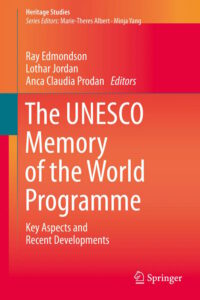
Der Sammelband, herausgegeben von Ray Edmondson, Lothar Jordan und Anca Claudia Prodan, vereint 21 internationale Wissenschaftler*innen welche die entscheidenden Aspekte für das Verständnis vom Memory of the World Programm, seiner Entwicklungen, sowie dessen Relevanz und Potential erörtern. Als Ziel setzt sich das Buch weitere Forschung an und um das Thema herum anzuregen und das Verständnis des Programms innerhalb und außerhalb der Heritage Studies zu verbessern.
Besprechung: Ryoko Nakano
The UNESCO Memory of the World Programme: Key Aspects and Recent Developments
Band 6 der Reihe Heritage Studies
Ray Edmondson, Lothar Jordan and Anca Claudia Prodan (Eds.)
Veröffentlicht: 2020
Springer International Publishing AG
Das Buch bei springer.de: https://link.springer.com/book/10.1007/978-3-030-18441-4.
Die vollständige Serie “Heritage Studies Series“ auf springer.de
INHALT / TABLE OF CONTENTS
Introduction: A New Road Is Opened
Ray Edmondson (Australia), Lothar Jordan (Germany), Anca Claudia Prodan (Germany/Romania)
Memory of the World: Basics, Principles, and Ethics
Memory of the World: An Introduction
Ray Edmondson (Australia)
Memory of the World: Key Principles and Philosophy
Joie Springer (Barbados)
The Memory of the World Registers and Their Potential
Roslyn Russell (Australia)
Memory of the World: The Recommendation, Guidelines and the Politics of Memory
The Pathway to the Recommendation Concerning the Preservation of, and Access to, Documentary Heritage Including in Digital Form
Helen Jarvis (Cambodia)
Reviewing the MoW General Guidelines: Reflections on the Experience of 2015—2017
Ray Edmondson (Australia)
History Wars in the Memory of the World: The Documents of the Nanjing Massacre and the „Comfort Women“
Kyung-ho Suh (South Korea)
Memory of the World in Context: Heritage Diversity and Convergence
Methodological Convergence: Documentary Heritage and the International Framework for Cultural Heritage Protection
Richard A. Engelhardt (USA), Pernille Askerud (Denmark)
The Appropriation of the UNESCO Memory of the World Programme in the Sociocultural Context of West Africa: The Contribution of the Department „Heritage Professions“ of the University Gaston Berger of Saint-Louis of Senegal to a Better Management of Oral Archives
Papa Momar Diop (Senegal)
Making the Past Visible for the Future: Map of the Old City of Aleppo
Sepideh Zarrin Ghalam (Germany/lran), Christoph Wessling (Germany)
Technological Challenges
Memory of the World, Documentary Heritage and Digital Technology: Critical Perspectives
Anca Claudia Prodan (Germany/Romania)
Documentary Heritage in the Digital Age: Born Digital, Being Digital, Dying Digital
Titia van der Werf (Netherlands), Bram van der Werf (Netherlands)
Documentary Heritage in the Cloud
Luciana Duranti (Canada/ltaly)
Audiovisual Documents and the Digital Age
Dietrich Schüller (Austria)
How to Make Information on Nuclear Waste Sustainable? A Case for the Participation of the UNESCO Memory of the World Programme
Jonas Palm (Sweden), Lothar Jordan (Germany)
Education and Research
UNESCO’s „Memory of the World“ in Schools: An Essay Towards a Global Dialogue Around a Common Culture of Universal Memories
Martin Porter (France/UK)
Memory of the World Education in Macau
Helen H. K. leong (Macau/China)
Approaching the Memory of the World Programme with Arts Education Projects
Jutta Ströter-Bender (Germany)
Exploring the Challenges Facing Archives and Records Management Professionals in Africa: Historical Influences, Current Developments and Opportunities
Shadrack Katuu (South Africa)
Terminology and Criteria of the UNESCO Memory of the World Programme: New Findings and Proposals for Research
Lothar Jordan (Germany)
Editors‘ Afterwords
Back to the Future: A Reflection on Fundamentals Ray
Edmondson (Australia)
Building Bridges Between Memory of the World, the Academic World and Memory Institutions
Lothar Jordan (Germany)
Heritage Studies and the Memory of the World: Concluding Reflections
Anca Claudia Prodan (Germany/Romania)
Weitere Ausgaben aus der Reihe Heritage Studies
- Cultural Heritage Protection in Korea – Contents of Law and Policy and their Changes in Relation to International Conventions
- Handbook on Intangible Cultural Practices as Global Strategies for the Future
- Claiming Back Their Heritage: Indigenous Empowerment and Community Development through World Heritage
- Dance Practices as Research – Approaches to the Safeguarding and Transmission of the Intangible Cultural Heritage of Dance
- 50 Years World Heritage Convention: Shared Responsibility – Conflict & Reconciliation
- Ein Metamodel für Kulturerbe-basierte Stadtentwicklung – Aktivierung von nachhaltiger Entwicklung durch städtisches kulturelles Erbe
- Intangible Cultural Heritage and Sustainable Development: The Valorisation of Heritage Practices
- Going Beyond – Perceptions of Sustainability in Heritage Studies No. 2
- Perceptions of Sustainability in Heritage Studies
- 40 Jahre Welterbekonvention
- Understanding Heritage

Sie müssen angemeldet sein, um einen Kommentar zu veröffentlichen.